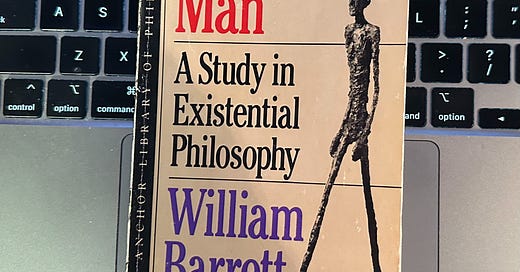Happy Passover. This is a random collection of material that I found interesting this week. Some are cartoons and some are articles. Enjoy.
1.
Eli Valley’s cartoon in Jewish Currents
I love how this cartoon captures the absolute lack of courage the major universities have shown so far in the face of President Donald Trump’s attacks. There are loads of columns out there on this, but the cliche about pictures being worth more than words is apt here.
2.
I’m rereading William Barrett’s classic study of existential philosophy, Irrational Man. The book offers a good historical overview of the trends in philosophy, art, and social life that made existentialism a movement. And it does a good job of explaining the thought of its major thinkers.
3.
Selina Zito, a columnist for The Washington Examiner, offers an interesting if narrow take on the America First agenda and its efforts to bring back factory jobs to the United States. The piece — in The Washington Post — is part of a genre in which journalists parachute into working-class communities and use their residents as characters in a set piece designed to push a particular agenda.
This one is decidedly pro-tariffs and pro-Trump, with a dose of anti-green rhetoric tossed into the mix. Tariffs are both complicated and a blunt instrument, and it is clear that the global free trade order has failed — as many of us predicted as long as three decades ago.
Free-trade organizations like the original NAFTA (and Trump's toothless successor) and the World Trade Organization were never about creating jobs. They were about corporate profits, which would be attained by moving jobs around to places where wages were low and environmental regulations are non-existent. The upshot became a race to the bottom, with corporations using the threat of relocation against workers.
The free-trade consensus was bipartisan, which accelerated the severing of workers from the Democrats that started with white opposition to civil rights was weaponized by Nixon and Reagan and portrayed as zero-sum. Every gain made by a black worker was seen as a lost job for whites — a calculus playing out again in the immigration debate.
Environmental regulations were also demonized as red tape. The fight over owls in the Pacific Northwest in the 1990s was used by the right to undermine green policies. Environmentalists, the argument went, cared more about owls than workers, even though the actual argument was that the loss of the owls should have been viewed as an alarm to the lumber industry that its practices were unsustainable.
The tariff debate today carries the echoes of earlier fights, but has been Trumpified, meaning his presence distorts the discussion. I don’t see the tariffs he is proposing doing what he says, because his approach lacks nuance and ignores the massive shift in how products are produced. He has failed to offer any real industrial policy, aside from “let’s go back to the good old days,” an unrealistic and foolish prescription for fixing a real economic ill.
Zito’s piece does little to illuminate these issues, instead building on Trump’s fetish for the past and rehashing the old complaints. Democrats, of course, have made this easy by also ignoring unions and avoiding industrial policy.
Workers are angry and should be, but we need a much more nuanced and fully fleshed out discussion, which may include targeted tariffs but also federal supports for the kind of jobs likely to be done in the future, and a rebirth of strong unions who have a say in workplace decisions and will defend the wages and benefits of all workers.
4.
I also finished Aharon Shabtai’s Requiem, his latest book of poems. It is a striking collections, and is more evidence that he is probably the ethical voice of Israeli verse. I plan to have more on this and some thoughts on Refaat Alareer’s posthumous If I Must Die in a few weeks.






